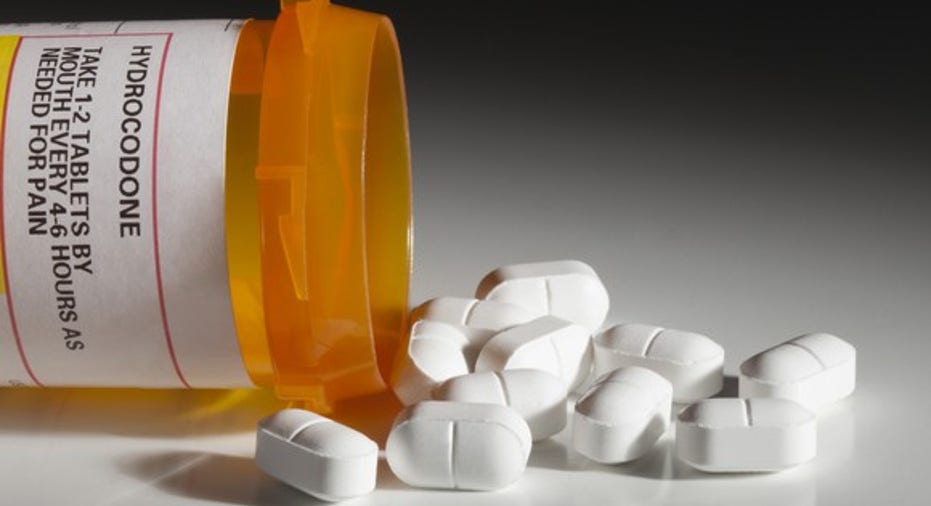How Much Pain Will Congress Inflict on These Opioid Drugmakers' Stocks?

A congressional committee once again has drugmakers in its crosshairs.
This time, it's the U.S.Senate's Homeland Security and Governmental Affairs Committee investigating five opioid drugmakers to determine if the companies' practices have contributed to widespread painkiller overdoses in the U.S.
Sen. Claire McCaskill (D-Mo.) sent letters toPurdue Pharma, Johnson & Johnson (NYSE: JNJ), Insys (NASDAQ: INSY), Mylan (NASDAQ: MYL), and Depomed (NASDAQ: DEPO) requesting information to help the committee in its investigation.How much pain will this latest Senate probe inflict on the drugmakers' stocks?
Image source: Getty Images.
What the investigation is all about
According to the Centers for Disease Control and Prevention (CDC), more than 33,000 Americans died from opioid overdoses in 2015 -- an all-time record. Nearly half of those deaths involved prescription opioid drugs.McCaskill suspects that major drugmakers are largely to blame.
According to a press release from the committee, the investigation "willexplore whether pharmaceutical manufacturers -- at the head of the opioids pipeline -- have contributed to opioid over-utilization and over-prescription" causing the current epidemic.In her letter to the five companies, McCaskill said, "This epidemic is the direct result of a calculated sales and marketing strategy major opioid manufacturers have allegedly pursued over the past 20 years to expand their market share and increase dependency on powerful -- and often deadly -- painkillers."
McCaskill also stated in her letter that drugmakers have allegedly encouraged physicians to prescribe opioid drugs "for all cases of pain and in high doses." She mentioned that there are reports that the companies have downplayed the risk of opioid addiction in their marketing and promotional efforts.
The targeted drugmakers
Privately held Purdue Pharma's products include opioid painkillers, prescription sleep drugs, and several over-the-counter medicines. In 2007, the company and three of its executives plead guilty to charges of misleading the public about the addiction risks of its opioid drug OxyContin. Purdue paid a $634.5 million fine.
Johnson & Johnson was included with Purdue and several other pharmaceutical companies in a 2015 lawsuit by the city of Chicago alleging that the drugmakers deceptively marketed their opioid drugs. Both J&J and Purdue denied the allegations.
Insys wasn't named in the Chicago lawsuit, but has been impacted by the opioid controversy elsewhere. Six former executives and managers face charges alleging that they bribed physicians to prescribe opioid spray Subsys even when it wasn't medically appropriate.
Mylan markets several generic opioid drugs, including fentanyl and oxycodone. The company has been targeted by McCaskill and the Senate committee before, but over pricing increases of its generic opioid overdose treatment drug naloxone.
Depomed generates more than 60% of its total revenue from opioid drugs Nucynta and Nucynta ER. J&J sold the commercialization rights for Nucynta to Depomed in 2015.
Questions and answers
Three questions come to mind with this latest news.
First, why is a Senate committee focused on homeland security and governmental affairs launching this investigation rather than the Senate committee that focuses on health? This one is easy to answer: It's politics. All Senate committees have a lot of leeway in what comes under their jurisdiction, and McCaskill seems to relish going after pharmaceutical companies.
Second, why these five drugmakers and not others? I'm not sure. Mylan, for example, is only ranked as the 17th largest supplier of opioid drugs in the U.S. It's not clear why the company was included in the latest investigation while other drugmakers (for example, the others sued by the city of Chicago) weren't. Perhaps the most likely answer is the one already mentioned: politics.
Third, will the Senate investigation seriously hurt these stocks? I suspect the answer is "no." J&J's and Mylan's stock price barely moved after the Senate probe was announced. Insys is still basking in the glow of its long-awaited scheduling for cannabinoid drug Syndros.
DepoMed's stock is down, but not because of the Senate investigation. The company replaced its CEO and named three new directors to its board (including the new CEO) after significant pressure from activist investor Starboard Value LP.
The Senate committee will likely get its pound of flesh from each of these companies. And if clear evidence is subsequently found of misdeeds (through the legal process, not from the committee), the drugmakers should pay the appropriate penalties. For now, though, other factors will drive what happens with these stocks.
10 stocks we like better thanWal-MartWhen investing geniuses David and TomGardner have a stock tip, it can pay to listen. After all, the newsletter theyhave run for over a decade, the Motley Fool Stock Advisor, has tripled the market.*
David and Tomjust revealed what they believe are theten best stocksfor investors to buy right now... and Wal-Mart wasn't one of them! That's right -- theythink these 10 stocks are even better buys.
Click hereto learn about these picks!
*StockAdvisor returns as of March 6, 2017The author(s) may have a position in any stocks mentioned.
Keith Speights has no position in any stocks mentioned. The Motley Fool owns shares of and recommends Johnson and Johnson. The Motley Fool recommends Mylan. The Motley Fool has a disclosure policy.



















